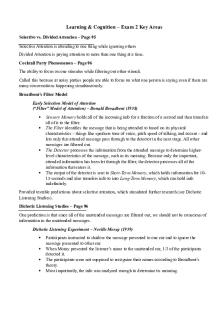Psych Exam 2 - Lecture notes Test 2 PDF

| Title | Psych Exam 2 - Lecture notes Test 2 |
|---|---|
| Course | Introductory Psychology |
| Institution | Virginia Polytechnic Institute and State University |
| Pages | 2 |
| File Size | 81.2 KB |
| File Type | |
| Total Downloads | 36 |
| Total Views | 128 |
Summary
Study Guide ...
Description
Psych Exam 2 25 Q Test 1, 25 Q Test 2 11 Q learning 10 Q Motivation 1. Maslow’s Hierarchy of Needs (diagram in book) o Psychological needs o Safety Needs o Acceptance needs o Esteem Needs o Need for self actualization (top) 2. Revised it: its self transcendence (top)**** o We will be the best we can be by serving others (actively caring) 3. Situational vs Dispositional Factors o Situational: environment and situation can motivate you, and you can demotivate yourself o Dispositional: genetic factors that influence us, conscientious- we always want to do the best we can do – Zuckerman scale (measurement of risk taking) 4. Emotion is motivation o Emotion plus self ethicasy o Physiological arousal o Cognitive interpretation o Subjective feelings o Behavioral expression 5. Positive (approach) vs Negative (avoid) o Describes 7 different emotions o Disgust, happiness, anger, sadness, surprise, fear, contempt 6. Arousal and Performance o The inverted U (Yerkes-Dodson Law) o The greater the arousal the greater the performance o It peaks and then goes down with too much pressure and arousal 7. Social Facilitation inhibition (connected to the U) o An audience produced arousal and will help or hurt is depending on our readiness to perform the right behavior 8. Disposition: sensation seekers 9. Theories of emotion: o 3 basic theories o When does the emotion happen? o Cannon Bard: occurs at the same time you get a physiological response o James Lange 1. Behavior comes first, then subjective feeling o 2 factor theory – Schechter Theory 1. Interpreting the situation
10. Controlling Emotions o Emotional Intelligence (EQ) o Marshmallow Test: if you wait till give you another marshmallow 1. Better predicted their intelligence than an intelligence test o Nature (disposition) vs Nurture (situation) o Introverts vs Extroverts 4 Q Self motivation o How do you motivate yourself? o We need to help other believe that they are confident “Immediate consequences outweigh delayed consequences” o What is self-motivation? o How to increase self-motivation 1. Choice, competence, community 2. SMARTS goal setting Specific Motivational Achievable Relevant Trackable Shared 3. Behavior based feedback If then incentives/rewards Now-That rewards Supportive vs corrective feedback...
Similar Free PDFs

TEST #2 - Lecture notes Exam 2
- 34 Pages

Adolescent Psych Exam 2 Notes
- 25 Pages

Social Psych Notes Test 2
- 5 Pages

Psych 201 Exam #2 notes
- 28 Pages

Exam 2 - Lecture notes 2
- 5 Pages

Exam 2 - Lecture notes -
- 3 Pages

Psych Exam 2 Questions
- 10 Pages

Psych Exam 2 Review
- 7 Pages

Lecture 2 (psych 111)
- 4 Pages

Psych Midterm 2 Notes
- 3 Pages
Popular Institutions
- Tinajero National High School - Annex
- Politeknik Caltex Riau
- Yokohama City University
- SGT University
- University of Al-Qadisiyah
- Divine Word College of Vigan
- Techniek College Rotterdam
- Universidade de Santiago
- Universiti Teknologi MARA Cawangan Johor Kampus Pasir Gudang
- Poltekkes Kemenkes Yogyakarta
- Baguio City National High School
- Colegio san marcos
- preparatoria uno
- Centro de Bachillerato Tecnológico Industrial y de Servicios No. 107
- Dalian Maritime University
- Quang Trung Secondary School
- Colegio Tecnológico en Informática
- Corporación Regional de Educación Superior
- Grupo CEDVA
- Dar Al Uloom University
- Centro de Estudios Preuniversitarios de la Universidad Nacional de Ingeniería
- 上智大学
- Aakash International School, Nuna Majara
- San Felipe Neri Catholic School
- Kang Chiao International School - New Taipei City
- Misamis Occidental National High School
- Institución Educativa Escuela Normal Juan Ladrilleros
- Kolehiyo ng Pantukan
- Batanes State College
- Instituto Continental
- Sekolah Menengah Kejuruan Kesehatan Kaltara (Tarakan)
- Colegio de La Inmaculada Concepcion - Cebu





